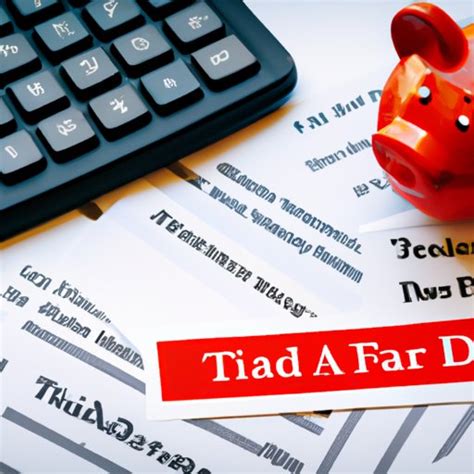If you’re struggling to pay your taxes, you may be wondering if you can still get financial aid for college. The answer is: it depends.

Types of Financial Aid
There are two main types of financial aid:
- Need-based aid is awarded to students who demonstrate financial need. This aid can come in the form of grants, scholarships, and loans.
- Non-need-based aid is awarded to students based on merit, regardless of their financial need. This aid can come in the form of scholarships and loans.
How Owed Taxes Affect Financial Aid
If you owe taxes, it can affect your eligibility for financial aid in two ways:
- Your Expected Family Contribution (EFC) may be higher. The EFC is a measure of how much your family is expected to contribute to your college costs. If you owe taxes, your EFC may be higher, which could reduce your eligibility for need-based aid.
- You may be required to file a tax return. If you owe taxes, you may be required to file a tax return before you can receive financial aid. This is because the IRS uses tax returns to verify your income and other financial information.
What You Can Do
If you owe taxes and are applying for financial aid, there are a few things you can do:
- File your tax return as soon as possible. The sooner you file your tax return, the sooner you can start the financial aid process.
- Contact the financial aid office at your school. The financial aid office can help you determine how your tax debt will affect your eligibility for financial aid. They can also help you find ways to reduce your EFC.
- Consider making a payment plan with the IRS. If you can’t pay your taxes in full, you can make a payment plan with the IRS. This will allow you to spread out your payments over time.
Common Mistakes to Avoid
When applying for financial aid, it’s important to avoid these common mistakes:
- Don’t ignore your tax debt. If you owe taxes, it’s important to address it as soon as possible. Ignoring your tax debt will only make it worse.
- Don’t file a fraudulent tax return. Filing a fraudulent tax return is a serious crime. It can result in fines, imprisonment, and loss of eligibility for financial aid.
- Don’t overestimate your income. When completing the FAFSA, it’s important to be honest about your income. Overestimating your income could reduce your eligibility for financial aid.
FAQs
Here are some frequently asked questions about taxes and financial aid:
- Can I get financial aid if I owe taxes? Yes, you can get financial aid if you owe taxes. However, your tax debt may affect your eligibility for need-based aid.
- What if I can’t pay my taxes? If you can’t pay your taxes, you can make a payment plan with the IRS. This will allow you to spread out your payments over time.
- How can I reduce my EFC? There are a few ways to reduce your EFC, such as increasing your income, reducing your expenses, and increasing your assets.
- What if I make a mistake on my FAFSA? If you make a mistake on your FAFSA, you can contact the financial aid office at your school. They can help you correct your mistake.
Conclusion
If you owe taxes, it’s important to be honest about your tax debt when applying for financial aid. Ignoring your tax debt or filing a fraudulent tax return can have serious consequences. By following the tips above, you can increase your chances of getting the financial aid you need to pay for college.
Tables
Table 1: Types of Financial Aid
| Type of Aid | Description |
|---|---|
| Need-based aid | Awarded to students who demonstrate financial need |
| Non-need-based aid | Awarded to students based on merit |
Table 2: How Taxes Affect Financial Aid
| Effect | Description |
|---|---|
| Higher EFC | Your EFC may be higher, which could reduce your eligibility for need-based aid |
| Required to file a tax return | You may be required to file a tax return before you can receive financial aid |
Table 3: Common Mistakes to Avoid
| Mistake | Description |
|---|---|
| Ignoring your tax debt | Filing a fraudulent tax return |
| Overestimating your income |
Table 4: FAQs
| Question | Answer |
|---|---|
| Can I get financial aid if I owe taxes? | Yes, you can get financial aid if you owe taxes. However, your tax debt may affect your eligibility for need-based aid. |
| What if I can’t pay my taxes? | If you can’t pay your taxes, you can make a payment plan with the IRS. This will allow you to spread out your payments over time. |
| How can I reduce my EFC? | There are a few ways to reduce your EFC, such as increasing your income, reducing your expenses, and increasing your assets. |
| What if I make a mistake on my FAFSA? | If you make a mistake on your FAFSA, you can contact the financial aid office at your school. They can help you correct your mistake. |
Tips and Tricks
- File your tax return as early as possible. This will give the financial aid office more time to process your application.
- Contact the financial aid office at your school if you have any questions. The financial aid office can help you determine how your tax debt will affect your eligibility for financial aid.
- Consider making a payment plan with the IRS if you can’t pay your taxes in full. This will allow you to spread out your payments over time.
- Be honest about your tax debt on your FAFSA. Ignoring your tax debt or filing a fraudulent tax return can have serious consequences.
